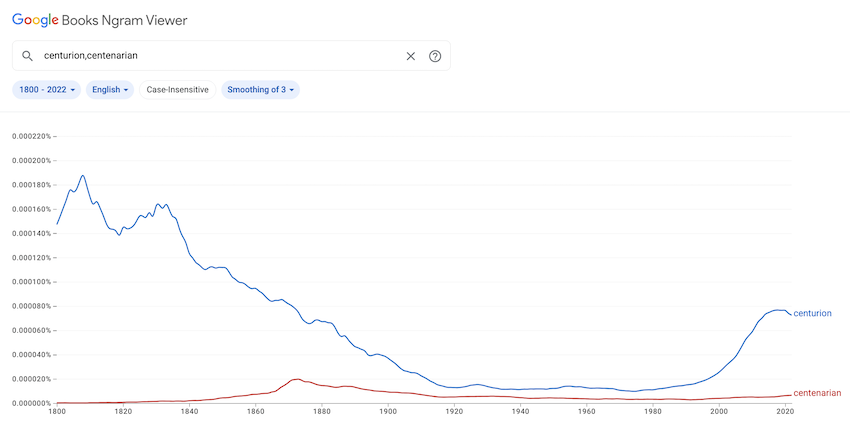
The two words, centurion and centenarian, sound similar, but they have quite different meanings.
A Roman officer in charge of about 100 soldiers was called a centurion, and the word also appears today in sports, business, and pop culture writing.
On the other hand, a centenarian always refers to someone who has reached 100 years of age.
When you understand the history, uses, and context of each word, it makes it easy to remember how to use them correctly.
What’s the difference between centurion and centenarian?

When you think about the word centurion, you probably imagine a Roman soldier wearing a tunic and a helmet with a red plume.
As the word implies, a centurion in ancient Rome commanded around 100 men. He was in charge of strategy, leadership, and enforcing strict discipline. They were respected and often celebrated for their bravery and skill.
Today, the word has moved on, far from the battlefield. In sport, a batter in cricket who scores 100 runs frequently gains the title of centurion because of the idea of achievement that the number 100 holds.
In football (soccer), a player who represents their country in 100 matches is also often referred to as a centurion.
The word centurion has also been coined to find its way outside of sport. For example, in nature, The Guardian reported on a centurion tree.
“Most of the largest and tallest were Eucalyptus regnans, commonly known as mountain ash, including a tree known as “Centurion”, measuring 96 metres…”
In finance, you can find the word describing authority or elite, such as The American Express Centurion Card.
However, centenarian is almost uniquely correct to mark longevity and the milestone of someone living to celebrate their 100th birthday.
The two words might cause confusion because they sound similar, but they have clearly distinct meanings.
History and modern usage
The word centurion, of course, has a long history because it dates back to the times of ancient Rome.
For centuries, the word was closely linked to the Roman army and leadership over around 100 soldiers.
In English usage, centurion appeared regularly in literature and historical accounts from the 16th century onward.

You can see that usage was quite widespread between 1800 and 1920, when writers often referred to Roman history in novels, essays, or even sermons.
During this time period, centurion was a familiar word in storytelling, education, and culture.
However, after around 1920, usage declined. It perhaps reflects fewer references to Roman military culture in everyday writing.
But from around the year 2000, the word has seen a new resurgence.
This increase is probably due to sports reporting, particularly cricket and football, where 100 has the sense of a significant achievement.
Media coverage of expensive brands and perhaps pop culture references could have also contributed to the word’s revival.
By contrast, though, centenarian has been much more stable in usage over the same timeframe.
Its use has slowly increased as life expectancy has risen, and more people are turning 100 years of age.
Recent decades, in particular, show a slight upward trend in the frequency of use.
The usage graph clearly shows the trends of use. Centurion had historical peaks and now a modern resurgence, while centenarian has been steady but continues to grow slightly today.
Is it confusion or a new usage?
Because the words sound so similar, they are sometimes subject to misuse through misunderstanding.
It’s easy to see how a writer might choose centurion when they really mean centenarian, since both relate to the idea of one hundred.
However, you could also say that the way the English language works, changing the sense of a word or its acceptability, is not uncommon.
Over time, meanings can shift and stretch, often by error, but sometimes by design.
Here are some examples, and I’ll let you make up your mind whether they are a mistake or intentional.
“The passing of time has done little to slow WA’s latest centurion, Alie Poepjes.” Source
“Fast forward 10 years and the now centurion (actually centenarian is the correct term) was able to head to William Hill and collect a very cool sum of £25,000!” Source
“How to live to be a centurion…but not to feel it!” Source
You could say that these examples are simply slips or poorly chosen vocabulary. But you could also say that they might reflect a slight change in use for centurion to mean an achievement or milestone. You can see that in the admission in the second example.
Always keep in mind that many words have changed or become acceptable, such as card sharp becoming card shark as a common variant, or literally being acceptable as a form of exaggeration.
Language adapts to how people actually use it, not just from how dictionaries define words.
Is it acceptable to use centurion as an alternative to centenarian? Perhaps it’s too soon to say, but to me there is some logic.
Conclusion
Obviously, centurion and centenarian share the common Latin root of centum, meaning one hundred.
And yes, the meanings are totally different. One is for longevity and living to be 100 years old, and the other originated because of the military rank of commanding 100 soldiers.
While both words have had their place and correct usage, it’s not unimaginable to think that the word centurion may become more acceptable for denoting 100 in any endeavor.
As the sporting world has done, it is now acceptable to label people who have achieved milestones of 100 as centurions. Not because of the battle, but because of the number.
Language, and particularly English, never stands still, with new words and new meanings for words occurring rapidly every year.
While it may not be correct (yet), there is a logical argument that if reaching 100 in an endeavor like runs in cricket or games played in football defines a centurion, then why not include age?
I’ll leave that as a question for you to answer.
Related Reading: Arcane And Archaic Explained For More Accurate Writing
Share This Article


